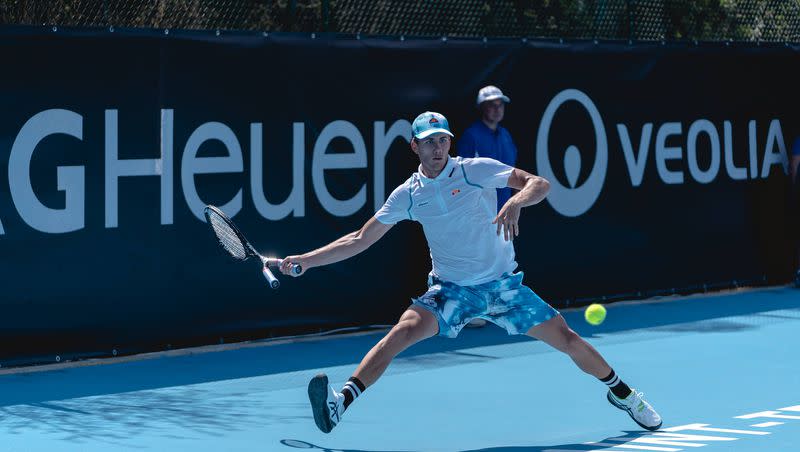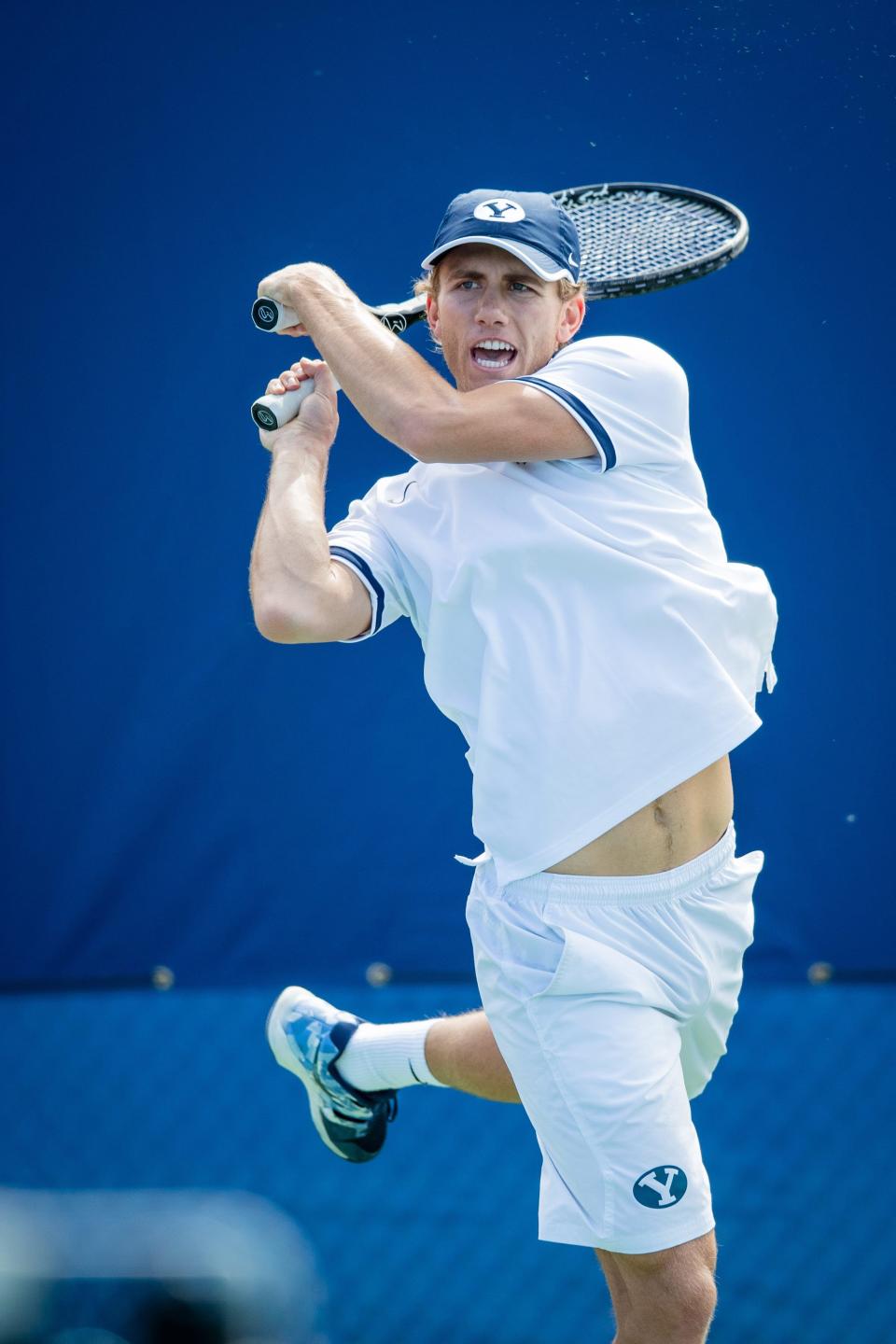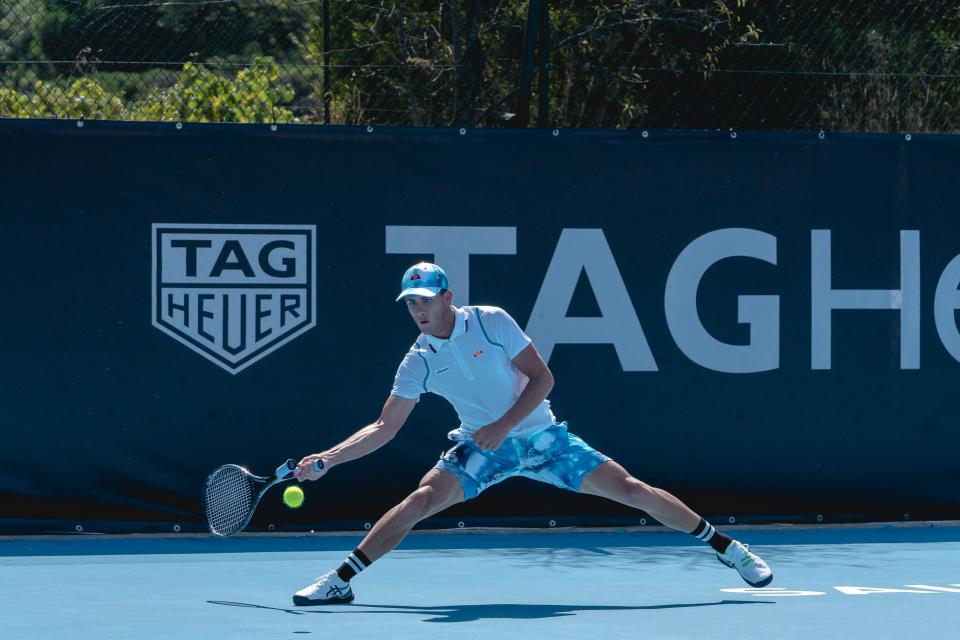What it takes to make a professional tennis career, through the lens of a former BYU player

It takes a special athlete to become a professional and reach the pinnacle in any sport. Typically fans, media and observers don’t see all the time and effort that professional athletes put in to perfect their crafts, not to mention the rigorous lifestyle of travel, diet and training.
That is especially the case for sports that go less noticed and the athletes that are still trying to find their way in those sports.
Tennis could be categorized that way, sometimes being overlooked in favor of other sports, despite producing tremendous athletes who have developed their own unique skillset.
Tennyson Whiting, a former BYU tennis player turned pro, knows firsthand that just like any other sport, his sport takes intense training and foresight to reach the biggest stage.
Multi-sport athlete
Whiting grew up playing many sports, including football and basketball; however, soon after entering high school, he was self aware enough to recognize that if he wanted to become a professional athlete it would need to be in tennis rather than a sport requiring an uncommon physique. Now, at 6 feet and 175 pounds, the foresight of the aptly named tennis player is paying off with continued effort.
Whiting maintains a rigorous schedule, playing in a tournament nearly every week and using much of the time between contests to lift weights, practice and travel.
“It just kind of bounces around, but it’s a lot of fun,” Whiting said. “Transportation, food and hotels are basically your main costs when you’re … on the tour.”
It can be difficult for up-and-coming professionals trying to make ends meet. In addition to covering their travel expenses, if they’re fortunate they have coaching expenses. Usually as competitors work their way up the ranks, they may begin to find financial relief through sponsors or even from the tournament they are playing in that week.
An uphill challenge
Anyone can pursue a tennis career by signing up for a professional account through the International Tennis Federation, but from there, competitors face an uphill battle.
“If you go and travel to super random spots, you might be able to slip into the (qualifiers) of those events,” Whiting said. “It’s kind of tough initially to start getting points unless you’re traveling to super random small tournaments.”
Athletes earn points through victories, bolstering their rating as they work their way up the sport’s ranks. Without any points, however, gaining entry into quality tournaments proves difficult and occasionally takes a bit of luck through the wild card process.
“(There are) wild cards for every tournament,” Whiting explained. “A wild card means they’re giving you — some random person — the opportunity to play the event.”
Whiting found himself in such a situation a few years ago, earning a spot in a tournament in Cancun as a wild card. A little bit of good fortune and a few points later, the first of his career, and he was off to the races having officially cracked his way into the profession.
Currently, Whiting is ranked No. 506 with 106 points. It has taken years of hard work for the former BYU tennis player to reach that level through determination, focus and countless hours of practice.
College tennis
“Leading up to (my) time at BYU, I was living in Florida training five, six hours a day,” he said. “So to go down to two, two-and-a-half, three (at BYU), it wasn’t enough tennis for where my goals were.”

To achieve his lofty goals, Whiting had to move on from college and from the United States. That decision afforded him more time to practice and put him in Europe, a tennis hotbed, and gave him a better opportunity to make a push at becoming a professional.
“They usually don’t have a lot of tournaments in the states or in the Western Hemisphere,” Whiting said. “It’s pretty sparse. Whereas in Europe … it’s a lot easier to get in (tournaments) and … traveling is cheaper and faster.”
Embracing experiences
The Utah native has seen firsthand that to build a successful tennis career, it takes one who is willing to embrace new cultures and can enjoy experiencing new things. For Whiting, that has come easily.
“Honestly, I really enjoy it,” he said. “Getting to be in Italy one week … in Madrid six days later, and then you’ll be able to go back to Prague (the) next week. It’s really fun for me.”
At age 16, Whiting began leaving his home in Mapleton for months at a time to accelerate his tennis training, taking online classes to stay caught up academically. He ultimately moved to Guatemala and then Florida to continue his pursuit of becoming a professional.
To make it as a professional tennis player, living years of a nomadic lifestyle is not uncommon. That makes it hard to develop relationships. Many competitors remain unmarried.
“It’s kind of impossible to have really tight, close relationships with anybody at home while you’re gone so much,” Whiting said. “It’s tough to really maintain friendships on the tour because you’re just not consistently around the people enough to really have strong relationships.”
It can get lonely paving a path as an up-and-coming tennis player. It takes a unique skillset to take on the obstacles in one’s path seemingly all on one’s own in such a solitary sport. That especially is true for athletes who focus on playing singles.
Single solidarity
“Singles is very, very mentally challenging,” Whiting said. “You’re alone … You’re on an island and you’re battling with the person across the net from you.”
Whiting plays doubles, allowing him to share some of that weight with a teammate. However, most doubles competitors don’t stick with the same partner for long periods of time, making their careers still solitary.
Ultimately, though, Whiting and many others are making a career playing the sport they love and that’s what counts. The Mapleton athlete has begun seeing his years of effort on the court pay off.
When asked what he loves about being a professional tennis player, Whiting said, “Finding success in things that you’ve dedicated your life to.”
Whiting hopes to remain on track and make that dedication breed even greater success as he continues to push for the top of the tennis world.


